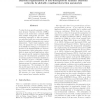Free Online Productivity Tools
i2Speak
i2Symbol
i2OCR
iTex2Img
iWeb2Print
iWeb2Shot
i2Type
iPdf2Split
iPdf2Merge
i2Bopomofo
i2Arabic
i2Style
i2Image
i2PDF
iLatex2Rtf
Sci2ools
JMLR
2012
2012
Bayesian regularization of non-homogeneous dynamic Bayesian networks by globally coupling interaction parameters
To relax the homogeneity assumption of classical dynamic Bayesian networks (DBNs), various recent studies have combined DBNs with multiple changepoint processes. The underlying assumption is that the parameters associated with time series segments delimited by multiple changepoints are a priori independent. Under weak regularity conditions, the parameters can be integrated out in the likelihood, leading to a closed-form expression of the marginal likelihood. However, the assumption of prior independence is unrealistic in many real-world applications, where the segment-specific regulatory relationships among the interdependent quantities tend to undergo gradual evolutionary adaptations. We therefore propose a Bayesian coupling scheme to introduce systematic information sharing among the segment-specific interaction parameters. We investigate the effect this model improvement has on the network reconstruction accuracy in a reverse engineering context, where the objective is to learn ...
Dynamic Bayesian Networks | Evolutionary Adaptations | Interaction Parameters | JMLR 2012 | Programming Languages |
| Added | 27 Sep 2012 |
| Updated | 27 Sep 2012 |
| Type | Journal |
| Year | 2012 |
| Where | JMLR |
| Authors | Marco Grzegorczyk, Dirk Husmeier |
Comments (0)

